|
Précis
| Winter 2004
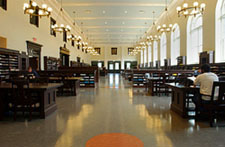 Reclaiming
the grandeur: Restored to its original two-story
height, the Matheson Reading Room once again serves as the centerpiece
of Candler Library, with all its old grandeur on proud display.
Dark, gleaming wood tables unencumbered by computer wiring,
heavy chairs, hand-crafted book and periodical shelving, graceful
hanging chandeliers, and a noble row of arched windows recall
the room’s former state, when for some thirty years it
was the heart of academic life on campus. Reclaiming
the grandeur: Restored to its original two-story
height, the Matheson Reading Room once again serves as the centerpiece
of Candler Library, with all its old grandeur on proud display.
Dark, gleaming wood tables unencumbered by computer wiring,
heavy chairs, hand-crafted book and periodical shelving, graceful
hanging chandeliers, and a noble row of arched windows recall
the room’s former state, when for some thirty years it
was the heart of academic life on campus.
“And
bright morning turned to night”:
This
fall, the Woodruff Library hosted the Peace Museum’s traveling
exhibition, “Searching for Peace: The Experience of Hiroshima
and Nagasaki,” which tells the story of the bombings through
poems and drawings by survivors, panel photographs of the destruction
and the victims, and charred, melted artifacts from the cities.
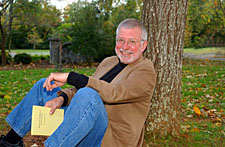 The
thrill of teaching: In
nearly two decades at Oxford, Lucas Carpenter,a poet and widely
published author, has been honored with several teaching awards
including the Fleming Award for Excellence in Teaching and the
Oxford Professor of the Year. In 2003, he became the first Oxford
professor to be honored with the University Scholar/Teacher
Award, Emory’s highest faculty honor. The
thrill of teaching: In
nearly two decades at Oxford, Lucas Carpenter,a poet and widely
published author, has been honored with several teaching awards
including the Fleming Award for Excellence in Teaching and the
Oxford Professor of the Year. In 2003, he became the first Oxford
professor to be honored with the University Scholar/Teacher
Award, Emory’s highest faculty honor.
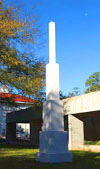 A
LeWitt for Emory: Emory
boasts rare literary collections, precious Greek and Egyptian
artifacts, and a wealth of fine architecture, but no major piece
of sculpture–until now.An
anonymous donor has enabled Emory to buy a sculpture by renowned
minimalist artist Sol LeWitt, the first such significant contemporary
sculpture in the University’s holdings and only the third
LeWitt on view in Atlanta. The piece, recently installed between
White Hall and the Administration building, is a simple tower
of white concrete titled Tower With Vertical Blocks 1. A
LeWitt for Emory: Emory
boasts rare literary collections, precious Greek and Egyptian
artifacts, and a wealth of fine architecture, but no major piece
of sculpture–until now.An
anonymous donor has enabled Emory to buy a sculpture by renowned
minimalist artist Sol LeWitt, the first such significant contemporary
sculpture in the University’s holdings and only the third
LeWitt on view in Atlanta. The piece, recently installed between
White Hall and the Administration building, is a simple tower
of white concrete titled Tower With Vertical Blocks 1.
Love
Across borders: Jennifer
Hirsch, assistant professor of international health in the Rollins
School of Public Health, talked with thirteen families in which
one sister or sister-in-law had migrated to Atlanta while the
other stayed behind in Mexico. Then she spent similar time with
their sisters in Atlanta’s burgeoning Latino community,
as she explored how their lives compare to those of their relatives
south of the border.
“To
dream and travel”:
In October, about two-hundred preschoolers, kindergartners,
and first-graders took part in “Around the World With Deans
and Directors,” sponsored by Reading is Fundamental and
Atlanta Public Schools Head Start program and organized by Elizabeth
Hornor, director of education programs at the museum.
First
class of Foege Fellows: Martin Swaka has run
hospitals with little or no electricity in Somalia and Southern
Sudan. Rose Zambezi organizes adolescent reproductive health
projects in Zambia. Sadi Moussa has engineered clean water supplies
for much of Niger. And 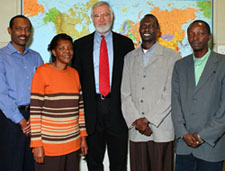 Ayman
Elsheikh helps track infectious and parasitic diseases in Sudan.
These four public health workers–the first class of William
H. Foege Fellows in Global Health–will spend two years
at Emory earning master’s degrees in international health
at the Rollins School of Public Health. Ayman
Elsheikh helps track infectious and parasitic diseases in Sudan.
These four public health workers–the first class of William
H. Foege Fellows in Global Health–will spend two years
at Emory earning master’s degrees in international health
at the Rollins School of Public Health.
Sour
Grapes:
Just as a human toddler will indignantly throw down a cracker
if he sees his friend receive a cupcake, monkeys will turn down
previously acceptable rewards—cucumbers—if their partners
get sweet grapes for doing equal or less work. In
addition to revealing emotions such as grief and empathy, monkeys
may have an innate sense of fairness, according to researchers
at Emory’s Yerkes National Primate Research Center and
the Living Links Center.
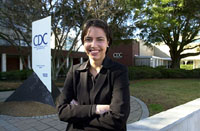 A
Perfect Fusion: When
alumna Sarah Knisely Handy ’01C
found herself drafting congressional testimony for the
Centers for Disease Control and Prevention (CDC), she realized
she had traveled full circle. “It
was a perfect fusion of my personal, professional, and academic
lives,” said Handy, a program analyst for the financial
management office of the CDC since shortly after her graduation
from Emory with highest honors in political science. A
Perfect Fusion: When
alumna Sarah Knisely Handy ’01C
found herself drafting congressional testimony for the
Centers for Disease Control and Prevention (CDC), she realized
she had traveled full circle. “It
was a perfect fusion of my personal, professional, and academic
lives,” said Handy, a program analyst for the financial
management office of the CDC since shortly after her graduation
from Emory with highest honors in political science.
|
|